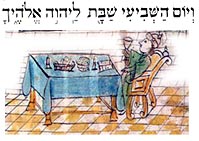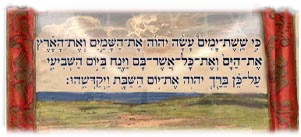1
The commandment to
observe the Sabbath is repeated in the Pentateuch twelve times.
Rabbi Jacob, called
the Ba'al ha-Turim, points out that the Sabbath Commandment
deals with the seventh day of the week, begins with the seventh verse
in the Ten Commandments, begins with the seventh letter of the alphabet,
and legislates rest for seven categories of creatures (Ex. 20.8-11).
2
According to an
ancient rabbinic tradition, ghosts and spirits, both good and evil,
owe their disembodied existence to the Sabbath. They were created
late Friday afternoon, and before their creation was completed the
Sabbath arrived. Hence they remained unfinished —
without bodies.

3
Abraham, Isaac,
and Jacob observed the Sabbath although they lived prior to the giving
of the Torah at Mount Sinai. That is why we read in the Sabbath afternoon
service: "Abraham was glad, Isaac rejoiced, and Jacob and his
sons rested thereon."
4
The Day of Atonement
never falls on a Friday or a Sunday because it would greatly inconvenience
people by making it necessary to prepare food both for the Sabbath'
and for the breaking of the fast.
5
Hosha'nah Rabbah
(seventh day of Sukkot) never falls on the Sabbath.
 6
6
The Greeks called
the Jews lazy because they abstained from work every seventh day.
7
Apion, the notorious
Alexandrian anti-Semite, who lived in the first century of the Common
Era, explained the origin of the Sabbath as follows: "When the
Jews had traveled a six days' journey, they had buboes in their groins;
and on this account it was that they rested on the seventh day...
and called that day the Sabbath, for that malady of buboes on their
groin was named Sabbatosis by the Egyptians."[1]
8
It was a common
belief among the ancient Romans that the Jews fasted on the Sabbath,
because no smoke was seen from their houses on that day.[2]

9
One of the privileges
that King James I of Aragon conferred upon the Jews of Valencia in
1262 provided that "Jews who were imprisoned for non-payment
of taxes were to beset free on Fridays at nightfall and be allowed
full freedom on the day and night of the Sabbath..., on condition
that they gave formal assurance of their return to the place of detention
the following morning."[3]
10
In the English
Ballot Act of 1872 special provision is made to enable voters "of
the Jewish persuasion" who object on religious grounds to mark
the ballot paper on the Jewish Sabbath to have, "if the poll
be taken on Saturday," their votes recorded by the presiding
officer in the same way as votes given by persons incapacitated by
blindness or other physical cause."[4]
11
Dr. David G. Mandelbaum,
in his article "The Jewish Way of Life in Cochin," records
the following tradition current among the Jews of Cochin, India: "While
the Jews could scarcely defend themselves against great armies of
marauders, it is clear that they were proficient in arms. The two
great opponents of the Malabar coast, the Raja of Cochin and the Zamorin
of Calicut, each had a brigade of Jewish soldiers in their forces.
In 1550, the allied Portuguese and Cochin armies fought against the
Raja of Vatakkenkur. The Portuguese captain planned to attack the
enemy on a Saturday, but the Raja of Cochin objected, because on that
day the Jews would not fight and they ‘were the best warriors
he had raised.'"[5]
12
The story of the
Sabbath river, the Sambatyon, that casts up stones on the six days
of the week but rests on the seventh, is corroborated by the historian
Josephus. The only difficulty with this corroboration is that the
river, according to Josephus, rests on the six days of the week and
flows only on the Sabbath. Furthermore, his evidence is based on hearsay.
There is also
a legend regarding a certain fish that rests on the Sabbath. Rabbi
David Kimlii, called the ReDaK, says in his commentary on the Bible:
"It is claimed that there is a certain fish in the ocean that
does not swim on the Sabbath, and rests all the day near the dry land
or near a rock.
13
One rabbinic tradition
has it that the Ma'ariv service on Saturday night is prolonged
as an act of pity for the souls of the wicked who are free on the
Sabbath from their expiatory suffering and resume their expiation
at the end of the Sabbath. The service is deliberately prolonged so
as to delay their return to suffering.
14
The Roman Catholic
Church, sixteen centuries after the Nicaean Council, still retains
the Sabbath of the Decalogue on its calendar, marking Sunday as the
Lord's Day and Saturday as the Sabbath.
|
[1]
Josephus Flavius, Against Apion, 2:2. [back]
[2] The Friday Night Book, Soncino Press,
London, 1933, p. 38. [back]
[3] Neuman, Abraham, A., The Jews in Spain,
Jewish Publication Society of america, 1942, Vol. I, p. 29. [back]
[4]Henriques, H.S.Q., The Jews in English Law,
Oxford, 1908, p. 247. [back]
[5] Mandelbaum, David G., "The Jewish Way
of Life in Cochin," in Jewish Social Studies, Vol.
I, No. 4 (1939), p. 429. [back] |
|
From
Sabbath: The Day of Delight, by Abraham E. Millgram
(Jewish Publication Society of America, 1944).
|